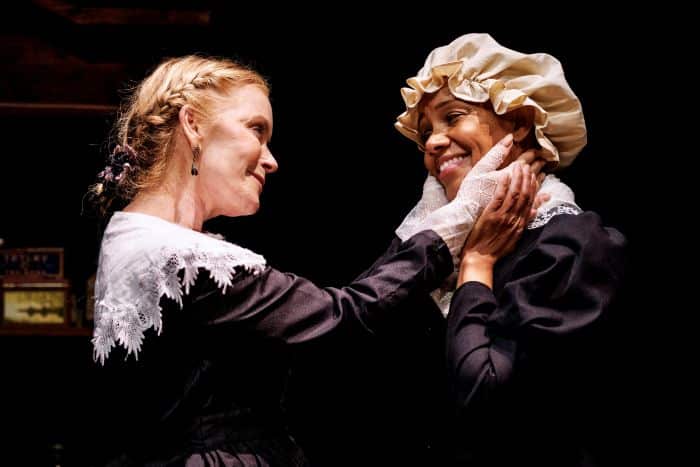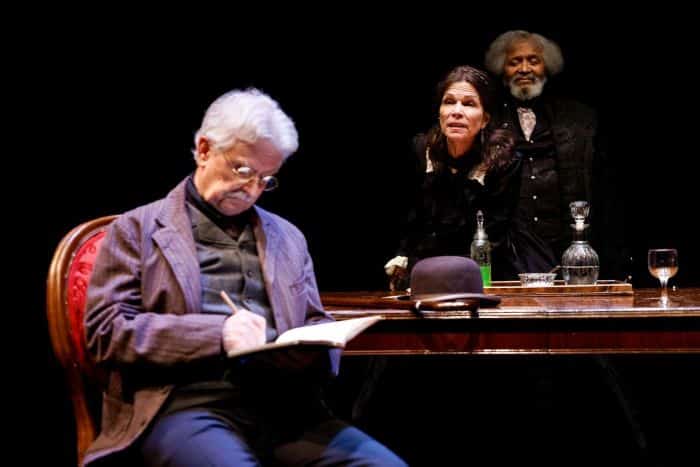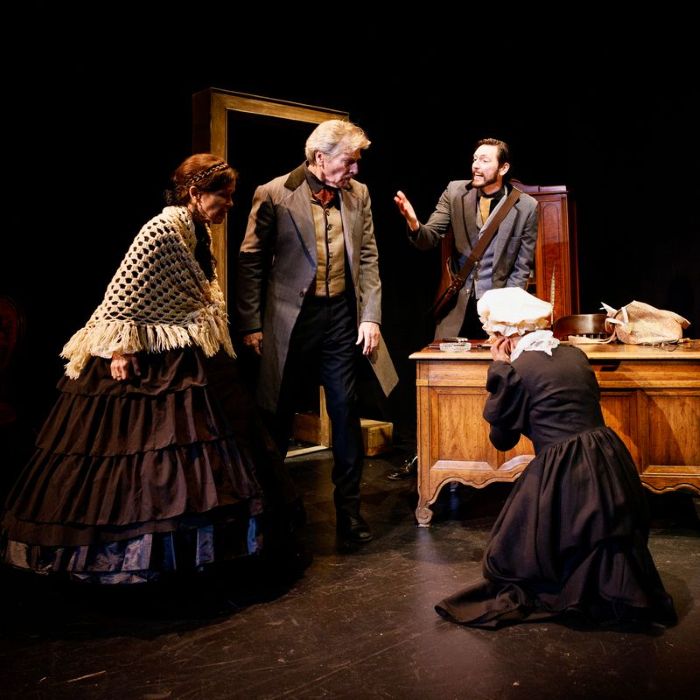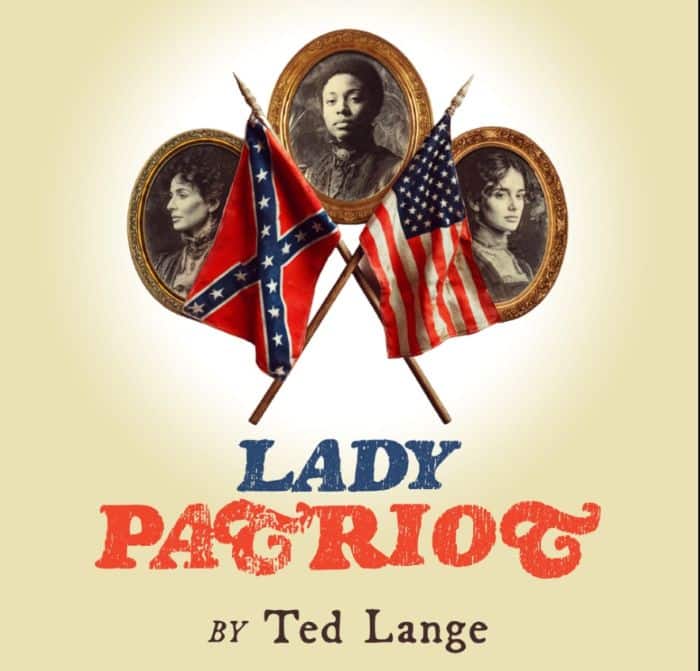Set in Richmond, VA, in the key years of 1861-65, through the duration of the Civil War, Lady Patriot, written and directed by Ted Lange and based on a true story, takes a deep dive into the patriotism and prejudice of three real-life women: Varina Davis (the wife of Confederate President Jefferson Davis); Elizabeth Van Lew (a Southern Unionist, philanthropist, and abolitionist); and Mary Bowser (acting as her slave and a spy for the Union). Making its New York debut in a limited twelve-performance engagement at Theatre Row, the thinly fictionalized extensively researched history play (the printed program contains a bibliography of 27 entries) is told with Lange’s signature mix of drama and humor to commemorate the women’s paramount roles in America’s evolution from the inhumanity of slavery to hard-won emancipation, to examine the roots of and reasons for their conflicting beliefs, and to challenge the traditional stereotypes that were then prevalent in the South. Mission accomplished.

The main plot revolves around confidential information on the Confederate war effort that’s being leaked to the Union side from the president’s office, which turns the tide of the war to the benefit of the North. Having just appointed Judah Benjamin, the first Jewish member of his administration, to a high position, Davis’s largely biased inner circle assumes that “the Jew” must be the spy. But Judah and the other top confidants who are privy to private discussions and documents seem to be above suspicion. Who could it be? No one could possibly suspect Mary Bowser, a hard-working, skillful, and obedient “special” young slave loaned to Davis’s pregnant wife Varina, to help her through gestation and delivery, by the seemingly ditzy and racist Lizzy Van Lew. But we soon find out that things are not always what they seem.
Lange directs a masterful cast of seven superb actors from the stage and screen, including two of his co-stars from the 1970s ABC TV series The Love Boat: Jill Whelan as Lizzy, surreptitiously adopting two distinctive personalities, and only showing glimpses of her true self and her real relationship with Mary when no one else is in the room (she also delivers the laughs with her ecstatic reaction to eating a biscuit during the growing wartime food shortages); and Fred Grandy as Mr. Slydell, a “Yankee journalist” with a secret connection to her, who delivers an impassioned climactic condemnation of the defeated Confederacy and Varina, as he conducts an interview with her at her post-war home in Savannah.

Josie DiVincenzo is thoroughly contemptible as the confederate first lady Varina, a privileged and adamant slave-owner with a taste for imbibing “the green fairy” (absinth), whose marriage isn’t as satisfying as either she or her husband would like, though she defends him, his “greatness,” the Confederacy, and her “southern heart” till the end. In the role of Jefferson Davis, Gordon Goodman is the epitome of wealth and power taking priority over ethical principles and human empathy. One of the most chilling, morally bankrupt, and sickeningly reprehensible lines in the play is spoken by Davis to Old Robert – his longtime attendant slave, with whom he shares a nightly cigar and drinks in the presidential office, played with irresistible charm, unrealized potential, heartrending loss, and conflicted loyalties by Count Stovall – as to why he sold his wife and children to other slave-owners: “It was a business decision . . . Don’t take it personal.”
Derek Emerson Powell as Judah, though fully aware of the rampant anti-Semitism, remains committed to the South and strategizes that the Confederacy should free the slaves to gain the support of Europe and to enlist them to fight against the Union (and then to enact new discriminatory laws after the war that will leave them free but not equal) – a move that is heartily rejected by Davis to preserve “the social fabric of Southern society” and the “cheap labor” that maintains its economy, despite their imminent defeat. And Chrystee Pharris masterfully embodies all the smart and heroic qualities of Mary, an educated Black woman who plays dumb but isn’t, while risking her life for the Union and the paramount cause of Black emancipation, and developing a bond with Old Robert, whom she teaches and encourages to start a new life beyond slavery, in a stirring performance filled with tenacity and heart.

In his writing of the gripping two-act eighteen-scene play, Lange never hesitates to include the “slave talk” dialect of Mary and Old Robert, or the offensive language that characterizes the pervasive dehumanization and bigotry of the Confederacy, with the characters spewing racist and anti-Semitic epithets in their southern accents and incessantly using the n-word, to create a more accurate depiction of what was. And he also employs touches of humor to alleviate some of the horrors of man’s inhumanity to man, keeping us laughing with the Union sympathizers, spies, and slaves, and laughing at the Confederates, driven by hatred, greed, and a false sense of white superiority.
Along with the compelling script, performances, and direction, an authentic artistic design transports us to the Civil War era, with period-style costumes (by Andrew Burns), including hoop skirts and mob caps for the women and frock coats and vests for the men, a set (by Paul Jonathan Davis) that recreates the 19th-century interiors of three separate rooms across the stage – a kitchen/pantry on the left, a formal dining room/state room in the center, and an office on the right – with antique Victorian furnishings and simple free-standing framework doorways for entry and exit, lighting (also by Davis) that shines a spotlight on the figures in each scene, and sound (by Will Mahood) that features recordings of the popular anthems of both the North and South, and captures the ever-encroaching war with the noise of cannons, guns, and galloping horses.
With Lady Patriot, Lange, his cast, and team have succeeded in his expressed goal of both entertaining and educating. It’s a compelling lesson in history that continues to resonate in our present time, must be seen, and should never be forgotten. My only criticism is that it’s here in NYC for such a short term.
Running Time: Approximately two hours and 20 minutes, including an intermission.

Lady Patriot plays through Saturday, September 20, 2025, at Theatre Row, 410 W 42nd Street, NYC. For tickets (priced at $70-90, including fees), go online.